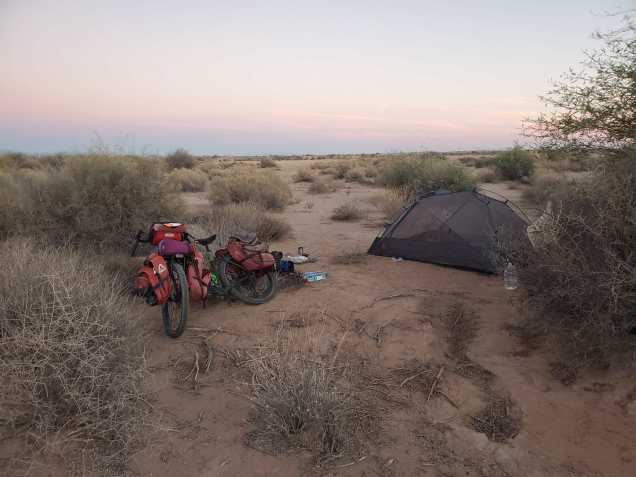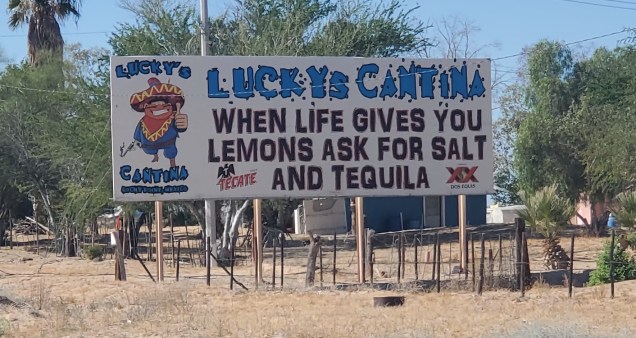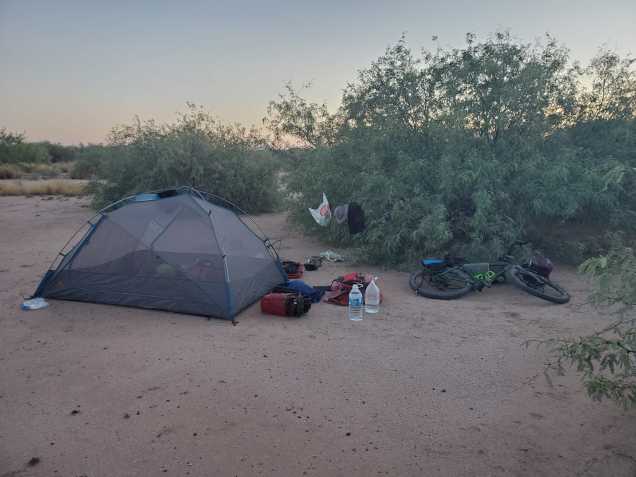Not surprisingly, one of the aspects of bicycle touring is that you have a lot of time to let your mind wander. This past week saw me on very desolate roads with little traffic, no houses or communities to look at and a nice wide shoulder so I did not have worry about cars or trucks. So I had a lot of time to think which is always dangerous. It started last post when I had just crossed the border into Mexico. As usual, I spotted the looming grotesque border wall as I approached. I always have mixed feelings when I see the wall. I understand we have borders and laws that should be obeyed regarding who can enter the country. And yet, I feel a certain injustice is being done, that governments should not be so extreme about keeping people out. Whatever happened to the Statue of Liberty?

I sometimes wonder what would happen if we just eliminated borders. No passports, no immigration, no customs. You can come and go as you like. If you want to work, no problem. Stay as long or as short as you like. Free movement of people and goods. No tariffs, no import or export regulations, no licenses. Would it be chaos or would it lead to an economic upsurge?
What I remember from economic class was that the economy is most efficient when markets are allowed to function with the least interference by governments. An efficient economy means more jobs, better wages and generally a higher standard of living or utility for all the inhabitants. A highly regulated economy leads to inefficiencies and a lower standard of living. This seems to make sense. Just look at the former Soviet Union, whose highly centralized economic model produced years of poverty for its citizens and eventually collapsed in 1991.
If that is any guide then the opposite may also be true: Let people move about as they wish and everyone will be better off. I know that if I were not subject to immigration and employment controls I would love to take a year off and go to France or Italy and work while learning the language, eating great food and seeing the sights. But I can’t do that. I am not allowed to stay more than 3 months and employment is prohibited.
So who benefits from all these controls? I’m not sure. They employ a lot of middle class bureaucrats that’s for sure. But businesses would love to have a global pool of potential employees to draw from. Workers would love to be able to go anywhere in search of jobs that suit their skills and desired pay. Tourists would love it, as well as the hospitality industry. I can’t think of any group that would oppose it, except as I said, all the government officials who now work in immigration and customs. But eliminating these jobs would be beneficial for them too; they would be free to pursue a more meaningful career. Sitting behind a custom desk processing passports all day cannot be all that satisfying.
I guess there would also be plenty of xenophobes who would be upset, but that’s their problem.
People say low wage unskilled workers would flood into “first” world countries. I say let them. There are millions of jobs that poorer people will gladly take on because it would be an improvement over their current life. Most of these jobs are rejected by the native work force. I know this from my own experience as a small business owner that the only people I could get to work for $8.00/hour were Mexicans. Americans did not want the jobs because they didn’t pay enough.
Eventually the market would absorb the workers until there was no longer a demand and wages and employment would settle out. At the same time, wages in the foreign country would increase as workers fled. Eventually wages there would rise and begin to attract more people back.
People say drugs would flood into rich countries. I’ll address the insanity of our drug laws in a future post. But the problem is not enforcement, the problem is the law itself.
Make no mistake, the global economy would be on a roller coaster for several years before all the dust settled and local economies would begin to stabilize. But I believe the standard of living overall globally would be higher. Sure, there would be pockets of businesses or individuals that may be worse off, but the vast majority would see an improvement in wages, lower prices, and generally a more efficient economy.
For that matter why do we still have nation states anymore? The world has become so interconnected the concept of a country seems archaic. Why not have one country called Earth and all current nation states just live under one global government? No more armies, no more dictators, no more nationalism. no declaring war on any one. Probably no more terrorists as well, since there would be no government to terrorize.
Or am i just recycling John Lennon’s old lyric:
Imagine there’s no countries
It isn’t hard to do
Nothing to kill or die for
And no religion, too
OK, that’s what you get after several days riding under a scorching desert sun. Enough rambling. Back to the road.
I crossed the border into Mexico at Sonoyta, a small dusty border town. I got a hotel the first night so I could make sure my phone worked, and to reacquaint myself with cycling in Mexico. Planning is important here because this is the Sonoran desert, a vast dry land with few shops and places to get water. After my first night I ended up camping for the next four nights. Here’s some shots of my camp sites.


I rode mostly south through Puerto Peñasco, Puerto Lobos, and Puerto Libertad.

As usual I passed dozens of roadside memorials. These three family members all died in one crash, on August 18, 2016. It looks like a mother, son and child.

This elaborate memorial was for Veronica Salazar, who died February 7, 2016. She was only 19 years old and evidently a football fan.


A memorial to Martine Soto.

This memorial also contains three crosses, and it appears they died in the same crash on June 9, 2008. The most prominent is for Fernando Sanchez, also age 19.

OK, enough grim reminders of how dangerous driving is. Go slow, people!
A couple more camp sites. They begin to look alike after awhile. But the nights are quiet and peaceful for the most part. You regularly hear coyotes howling but I’ve gotten used to them.


My grizzled sunburned face somewhere in the Sonoran desert.

A long stretch of road near Puerto Lobos.

The Sierra Blanca mountain range south of Puerto Peñasco.

At Puerto Libertad I was in a quandary. Google maps showed a store about 100 km away on the main road. But when I asked people about it they told me it was closed. The next water stop was another 100 km away. So no water for 200 km. This was a problem because I am not making great time. The short days and my physical limitations keep me to about 60 km per day max. So 200 km would take me more than three days. I use 2.5 gallons of water every 100 km so I would need to carry about 5 gallons which would weigh over 40 lbs. This was just not feasible. So I had no other option but to take a bus from Puerto Libertad to Miguel Aleman, about 250 km.


As I said, planning is critically important here. Google maps is usually right but I’ve noticed a lot more errors here in Mexico than in the USA. Shops that are supposed to be there aren’t, or are not located correctly. Hotels shown don’t exist. Other shops are closed. So in small towns I have to ask in advance to make sure my water supply exists.
One last shot of a HUGE cactus I came across.

That’s it for now. I am currently in the town on Guaymas, south of Hermosillo. I will stay near the coast until Mazatlan then maybe take another bus.
